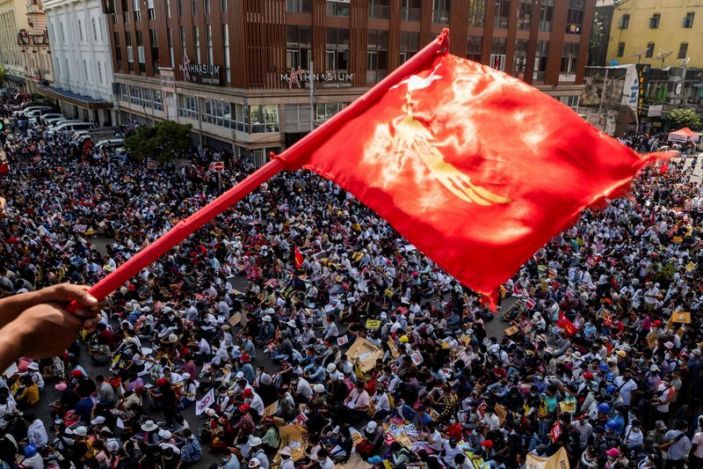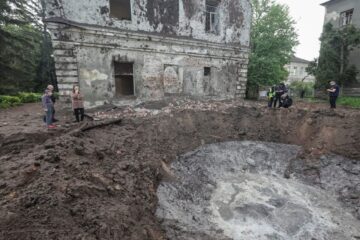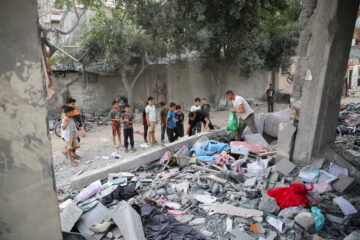From city centres to ancient capital, protesters denounce Myanmar coup
 Demonstrators protest against the military coup in Yangon, Myanmar, February 17, 2021. REUTERS/Stringer
Demonstrators protest against the military coup in Yangon, Myanmar, February 17, 2021. REUTERS/StringerProtesters were out again across Myanmar on Thursday, from busy intersections in downtown Yangon to the ancient capital of Bagan, people from all walks of life marched to denounce the Feb. 1 coup and the arrest of elected leader Aung San Suu Kyi.
The daily protests and strikes that have paralysed many government offices show no sign of easing despite a junta promise of a new election and appeals for civil servants to return to work and threats of action if they do not.
Tens of thousands of people took to the streets of the commercial capital, Yangon, a day after some of the biggest protests yet against the coup.
On Thursday, big crowds returned to Yangon’s central Sule Pagoda, others to another favourite protest site at an intersection near the main university campus.
The street marches have been more peaceful than the bloodily suppressed demonstrations seen during an earlier half century of army rule, but they and the civil disobedience movement have had a crippling effect on much official business.
Many motorists in Yangon drove at a snail’s pace in a show of opposition to the coup, a day after many pretended to be broken down to block police and army vehicles.
“I don’t want to wake up in a dictatorship. We don’t want to live the rest of our lives in fear,” said slow-car protester Ko Soe Min.
“I’ll be happy if government officers are late for work or can’t get there at all.”
In the second-biggest city of Mandalay, protesters rallied to demand the release of two officials arrested in the coup, and in the old capital of Bagan people with banners and flags marched in colourful processions against a backdrop of ancient temples.
Some protesters in Bagan stopped at one temple to put a curse on dictators, a witness said.
Putting an end to the civil disobedience campaign appears to be the military government’s priority.
Late on Wednesday, the junta issued arrest warrants against six celebrities, including film directors, actors and a singer, under an anti-incitement law, for encouraging civil servants to join the protest.
The charges can carry a two-year prison sentence.
“It’s amazing to see the unity of our people. People’s power must return to the people,” actor Lu Min, who was on the junta’s ‘wanted list’, posted defiantly on his Facebook page.
An activist group that monitors social media said that since Feb. 9, posts had shown some sort of protest in about 90% of cities and towns across the country.
The military says a majority of people back it actions.
TRAIN SERVICES TARGETED
Train services have been badly disrupted and after dark on Wednesday, security forces in Mandalay confronted striking railway workers, opening fire with rubber bullets and catapults and throwing stones, residents said.
One charity worker was wounded in the leg by a rubber bullet.
Neither the army nor the police made any immediate comment on the incident, but the army’s Facebook page said forces were providing security across the country to “make sure people have tranquillity and sound sleep”.
The number of people known to have been detained since the coup had reached 495 by Wednesday, Myanmar’s Assistance Association for Political Prisoners said in a statement. It said 460 remained in custody.
Halting Myanmar’s tentative transition towards democracy, the army took power after the electoral commission rejected its accusations of fraud in a Nov. 8 election won by Suu Kyi’s National League for Democracy (NLD), prompting anger from Western countries as well as the local protests.
Coup opponents are deeply sceptical of junta promises to hand over power after a new election for which no date has yet been set.
Nobel Peace laureate Suu Kyi, detained since the coup, now faces a charge of violating a Natural Disaster Management Law as well as charges of illegally importing six walkie talkie radios. Her next court appearance has been set for March 1.
Suu Kyi, 75, spent nearly 15 years under house arrest for her efforts to bring democracy.
The army says that one policeman died of injuries sustained in a protest. One protester who was shot in the head during a protest in the capital Naypyitaw is being kept on life support, but doctors say she is not expected to survive.
SOURCE: REUTERS









